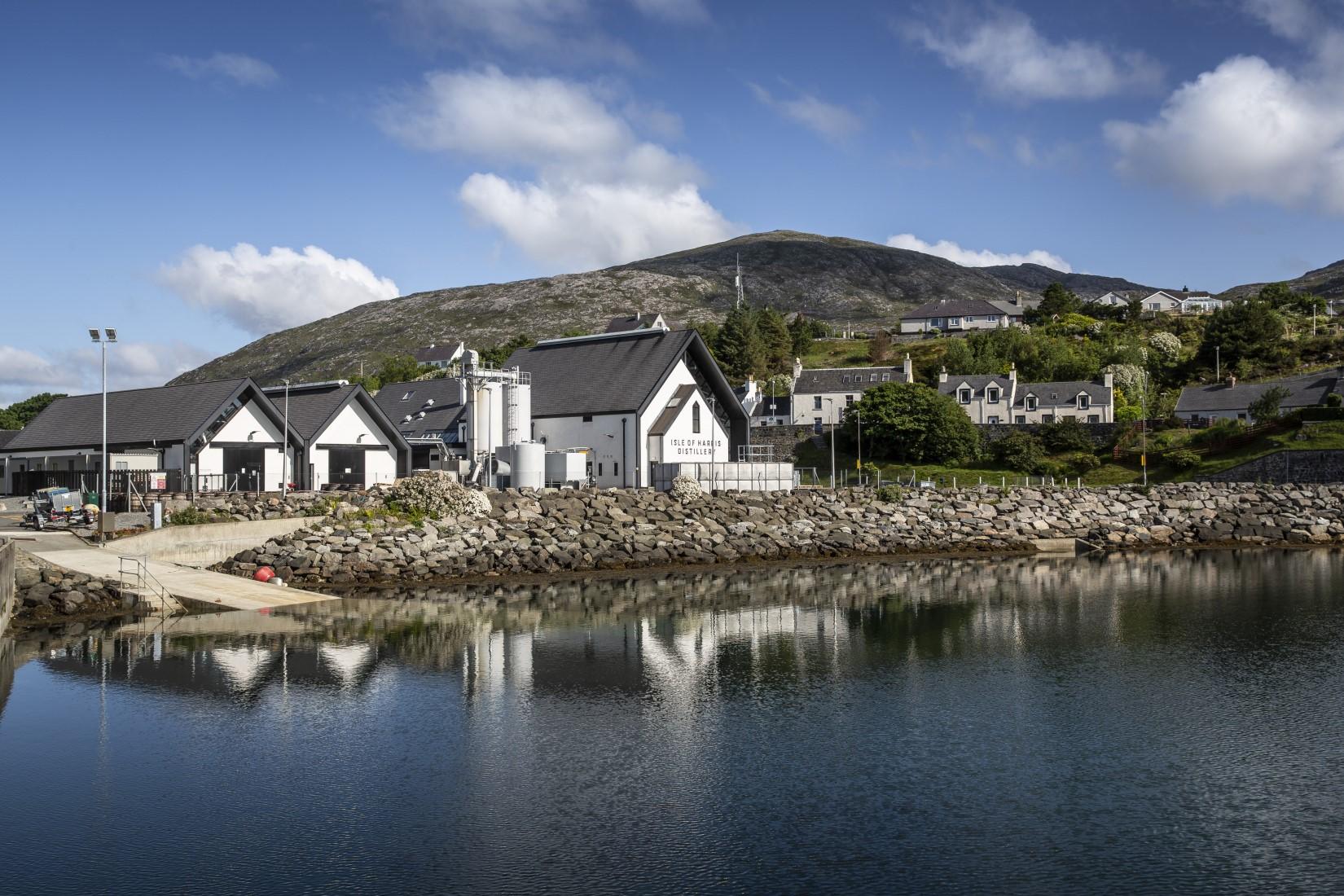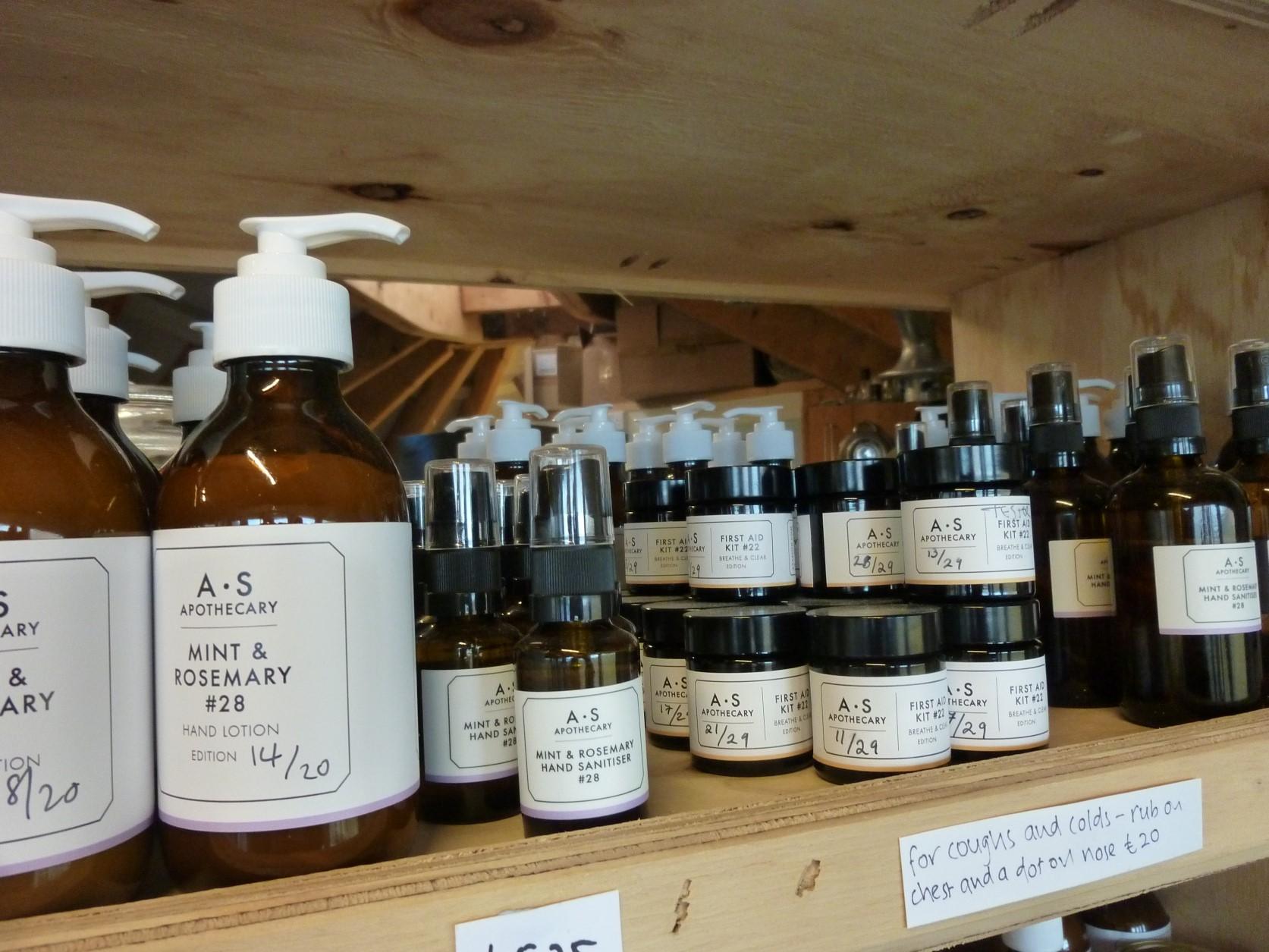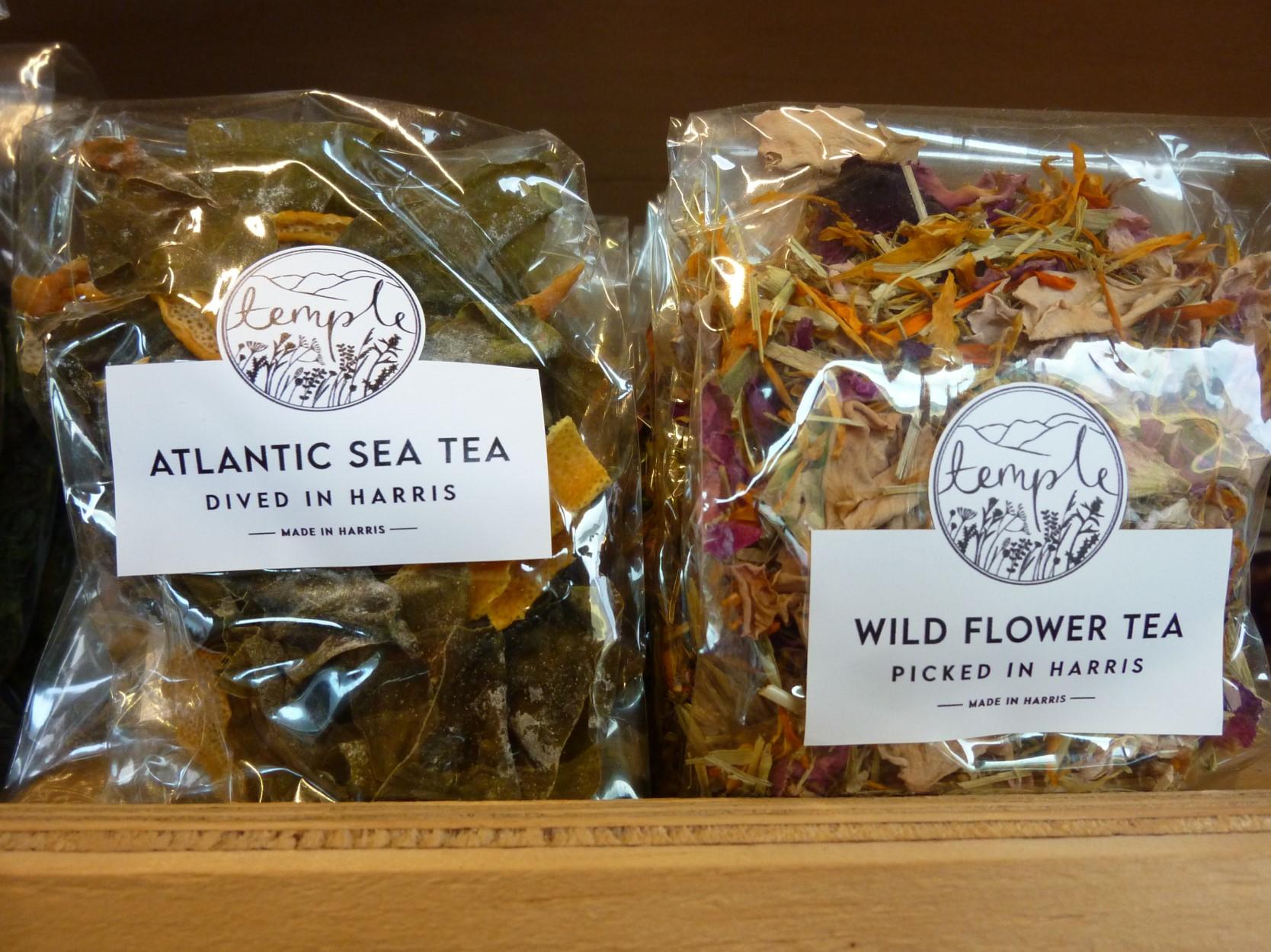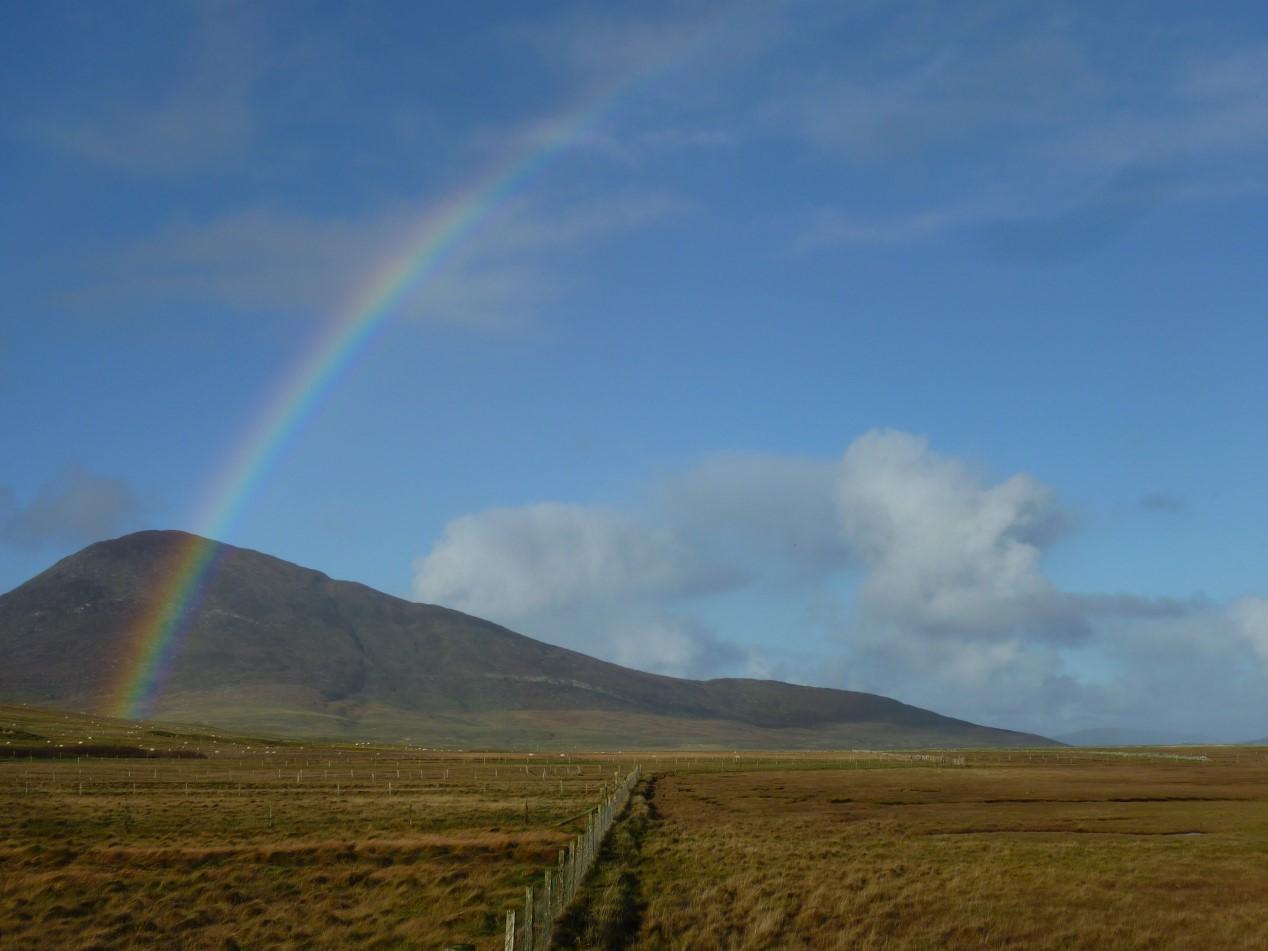
7 minute read
Kyra Pollitt meets Amanda Saurin
This day has come, and I’m nervous. As I emerge, early, from my wee Hebridean hobbit hole, I find myself at the end of a rainbow. I mean, actually at the end of a rainbow— my house is the pot of gold. I don’t have time to get out my shovel and dig, but I take it as a good omen, and I start my journey with a skip. I’m travelling from the East of North Harris to the West of South Harris and, all along the way, that rainbow seems to have coloured the scenery. There is the brave red of the post box at Reinigeadal, yellow in winter grasses, pink morning clouds, the green of the mosses, the purple hue of wet rock, orange bracken, and the impossible azure of the crashing surf at Horgabost. When I first moved to Harris, I was still an Herbology student at RBGE and dreamt I might one day brew potions and tinctures for the island Distillery. That was before I discovered an existing apothecary range, prepared specifically to complement Harris Gin by the Distillery’s consultant, from Lewes in East Sussex, Amanda Saurin. No matter, I reasoned, I would set up an island apothecary instead. A while later, the beautiful Temple café, situated on the island’s best stretch of wildflower machair, was put up for sale, along with a house and croft. Whilst I pondered how to make a dream a reality, it was sold— to one Amanda Saurin, rumoured to be thinking of turning it into… do I need to finish this sentence? Now, I’m about to meet this woman who seems always three steps ahead of me. I’m unsure if I’ll be able to like her, and my inner envy gremlin isn’t even sure I should try.
Of course, when I do meet her, she’s lovely— warm, charming, generous, intelligent, and oh so herbally erudite. It’s quite a relief, in a way. We sit together outside the café, on a glorious day, in the Covid-friendly fresh winter breeze, while Amanda tells me her story, and I feel as if I’ve been allowed to listen to big girls’ talk. Before us stretch sea, mountain and machair— an SSSI area, and what Amanda sees as ‘the terroir of the Hebrides’. But I’m getting ahead of myself, and one shouldn’t try to jump too far, too fast. Slow is important to Amanda: You have to work your way, plant by plant, until you understand what they need and how to get the best out of them.
Advertisement
Amanda grew up in Edinburgh, spending childhood holidays in the Highlands. She studied Law at Southampton University— where she found the physical environment a ‘terrible mistake,’ but met her husband. At the age of 25, she moved to rural Wales. By now a mother of two, Amanda wanted an alternative to conventional medicine for her children, and so began her engagement with plants, herbs and homeopathy. A mother and ceramist by day, she was also busy with herbal ‘books, books, books, planting, testing, and trying’ . Time, she notes, is ‘the best way to understand each and every plant’ and I am beginning to understand time as something Amanda commands firmly. Yet it’s at this point that her idyll is interrupted, when her husband’s career dictates a move to beautiful, but ‘unwild’, Sussex:
There is nowhere you can walk where you won’t meet someone, nowhere you can be where you won’t hear a car, or a plane, or a train. So, Amanda creates a wild garden— developing an orchard, a herb area and even a poison garden, which her, now four, children learn to treat with due respect. She completes her four-year Homeopathy qualification and does a lot of work with mother tinctures and flower remedies. Then the family moves to Cyprus, where Amanda meets the herbalist and Sufi, Miriam Khan. Over the next seven years, Miriam teaches her to distil waters and oils. As we brace the fresh Hebridean breeze, Amanda conjures warm air and sea, Orange Blossom (Citrus aurantium), Mountain Sage (Salvia officinalis), Wild Thyme (Thymus serpyllum), Kekik (Origanum majorana) and fresh honey. Mid-reverie, Amanda suggests I raise my eyes from my notebook, and there— beyond the place of summer ‘orchids, orchids, orchids’ —is



the other end of a rainbow; right here, right now.
When Amanda returns to Sussex, she establishes A. S. Apothecary, her fifth and final child goes to university, and she is met with another golden opportunity. Whilst running a workshop in 2014, she is approached by a young woman whose father owns a Distillery. Soon after, she is visited by ‘a magnificent fellow, dressed in tweed’ and they spend an afternoon discussing botanicals. Amanda stresses the importance of the fresh and the local in her practice: You grow the plants, you distil them, and you follow the rule of no more than 25 feet between plant and production. Don’t buy stuff in. Do it yourself. It makes a HUGE difference to the product. That means you can exercise discretion at the picking stage, your botanicals do not have to travel, and they are dried in the right conditions. Amanda soon finds herself being flown to the Western Isles to advise on the potential of the indigenous flora, and afterwards commissioned to develop the famous ‘marine pop’ of her Sugar Kelp Aromatic Water, companion to Isle of Harris Gin, which she has followed with a small-batch Gorse Tincture (a blend of Ulex europaeus, Crataegus monogyna, Urtica dioica, with a twist of Citrus limon), and a seasonal Harris Wild Rose Tincture (Rosa rugosa, sun-dried Cypriot Monarda fistulosa, Sambucus nigra, Prunus spinosa) that flew off the shelves.
Yet, as Amanda points out: The beauty of working with plants is that you never finish work. Certainly, she is indefatigable. Following a steady stream of clients seeking herbal help for eczema and psoriasis, she finds herself ‘accidentally in the beauty industry’. We spit for a while about hyaluronic acid, retinol, cosmeceuticals, greenwashing and the whole anti-ageing ‘nonsense’. By contrast, Amanda suggests we seek ‘not youth, but health’ and finds ‘whole plants make extraordinary skincare’. She notes: There is an appetite for genuinely clean skincare and there are very few people genuinely doing it. Hence, A.S. Apothecary grows Roses (R. mundi, R. damascena, R. rubiginosa), Calendula (C. officinalis), Chamomile (Matricaria recutita) and Hypericum (Hypericum perforata) on its Sussex farm, and uses the fresh oil of Olives (Olea europaea) harvested from single Cretan groves, to make properly green, ‘gender fluid’ products, beautifully branded by Melissa Bourke— former Art Director of Harper’s Bazaar. When choosing skincare, Amanda advises: Look at the label— if you can’t say it, don’t buy it. If it says, ‘extracts of’ consider how many processes the plant has gone through. Ultimately, put on your skin nothing you can’t spread on toast.
It was the combination of her involvement with Harris Distillery and her skincare expertise— her practices as distiller, rectifier, modifier — that facilitated her ‘nimble’ response to Covid19; a beautiful, first-to-market, hand sanitizer, which smells and feels divine and doesn’t leave the hands feeling brutalized. For every bottle sold, Amanda gives three away to key workers and the vulnerable, simply because, she says, ‘it’s in my gift’.
It was the pandemic which gifted her the opportunity to move to Harris full-time— leaving her daughter, Bell, in charge of the Sussex operation. So here we both sit, master and apprentice, amidst the beauty and the gift of this place. We talk of rediscovery, as Amanda contrasts the tall, thin, wiry stalks of her Sussex Meadowsweet (Filipendula ulmaria) to the sturdy stem, taste and scent profile of its Hebridean counterpart: It’s like different plant! If you love plants, and work with plants and herbs, you are always learning. You think you know it, but you never do. You only know how little you know.
Readying to leave, we move to the café door where I notice a tribute to the Scottish botanist, William MacGillivray (1796-1852). It seems the
Fates have conspired to ensure Amanda’s latest venture is taking place on the very site where the famous field naturalist spent his formative years. ‘Yes, I’ve been reading up on him’, she says: he seems unfathomably prejudiced against people from Lancashire, describing them as ‘short-legged’! When I protest that my legs are of adequate length, and I am originally from Lancashire, Amanda tells me her husband is, too. There follows the usual conversation in which we exchange co-ordinates. We get beyond county, to city, then village, then street, eventually discovering that Amanda’s husband and I played together as children— when he visited his grandparents, who lived opposite my parents. Well, how’s that for fate, locality and co-incidence? Images: Harris Distillery, Amanda Saurin courtesy of Grove Communications for Harris Distillery. All other images, Kyra Pollitt.












